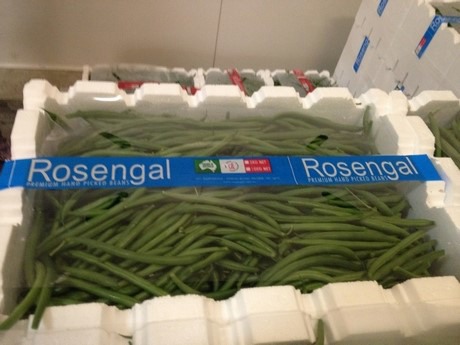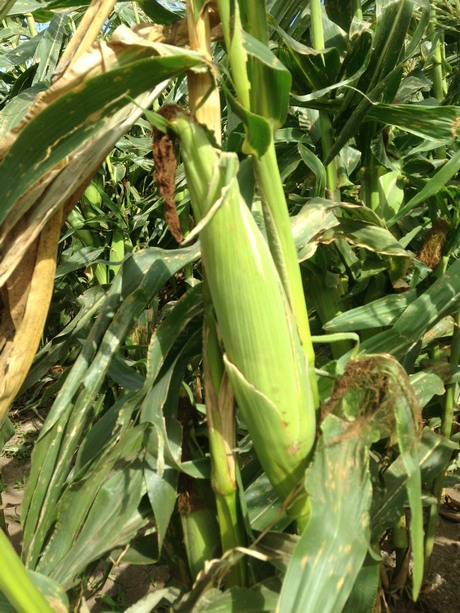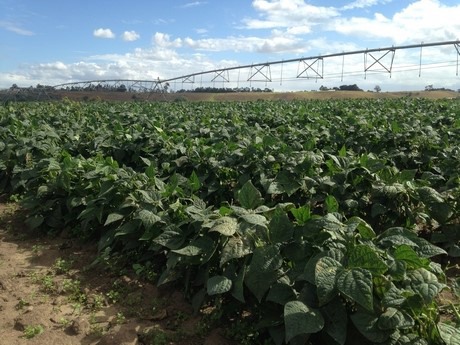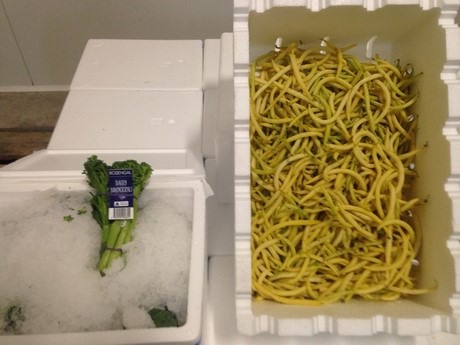Vegetable farmers in Victoria's East are facing the prospect of not being able to farm, because there is not enough water to keep the plants alive.
Manager of Rosengal Group's Lindenow farm, Dom Galati says he has experienced just 120 millimetres of rain since September, and most of the season so far was on restricted water supply from the Mitchell River, but has since been cut off completely.
"It started out very cold and dry between September and December and we have had virtually no rain," he said. "So, a farmer like myself, I cannot irrigate, and it has been like that for the past month. I don't have any bores - there wasn't any on the property when we bought it. So, I have been back on the farm for seven years, and I have never had a bad year like this one. It is very hard; without water we cannot grow. Like any other farmer in any other industry - whether it be a dairy farmer, cattle farmer, sheep grazier - we all need the rain."

He adds that he has taken every measure that he can, but his only hope is to watch the skies and "pray for rain", as he cannot afford other irrigation options at this time.
"I've ticked every box that I can possibly tick," he said. "I don't have any water. I have to install a bore, which is very expensive and I am talking between $150,000-$200,000 just for one bore on one property. The crops have somehow survived until now, and we have been able to harvest green beans until today. But they just survived, and I mean just that. They haven't thrived. They are not huge lush green bushes with 100 per cent yield - we are down to around 10 per cent. It's not viable, but it is better than nothing. We try because our customers are with us 52 weeks of the year, and we need to give them something."

Mr Galati moved onto the farm when he was nine, after his parents bought the Lindenow property in 1986, following a shared farming agreement with the neighbours. Ten years later Dom and his brother David ended up in the wholesale markets, and during that time they also bought a property in Bundaberg.
"We have been selling vegetables for a long time, we know what marketers expect and we are still improving our farming practices every day," Mr Galati said. "We try every day to get a better article that is fresher to the consumer, which is very hard to do. We are passionate about farming and taste and we want kids to understand how the product is grown; that is how a bean or sweet corn or broccoli ends up on the plate."
The peak season for the growing region in Eastern Victoria is in the summer, with the company's Queensland property coming online in the winter. Mr Galati says one block is sown each week until the end of January, with those plants maturing by April.

Rosengal supplies to the Melbourne, Sydney and sometimes the Brisbane wholesale market. On an average year, 200 tonnes of green beans are produced covering 60 acres, and what sets the company apart is that it is all picked by hand.
"So, a lot of manual labour involved," he said. "There is a lot of early starts. We begin harvesting between 5am and 6am by hand, and as soon as we have 400-500 kilograms it will come up to the cool room, and it is ongoing. We always bring it up to the cool room to keep it fresh, improve the shelf life and keep the taste there. Another main line we grow is sweet corn (approximately 50 tonnes). It's not as intensive, but it is still important we get it out of the field. Once it gets too hot it loses its sugar content, and it goes starchy. Baby broccoli (approx. 100 tonnes), or bunching broccoli, is another item we have grown, albeit with limited success, but it's doing OK. We might do a few sweet peas in autumn or peas in winter - but that's just for fun."

It is the hand-picked harvesting and the focus on quality that sets the company apart from much larger competitors.
"We are in a niche position with our hand-picked green beans," Mr Galati said. "If we sell 1,000 boxes, or 10 tonnes a week, that's a good week. But we will be trying to sell at a premium because our article is a premium. We are looking at quality, taste and high-profit. But if we had more acreage, we could go the other way with a higher turnover of units. Taste is the number one thing with all our products. I hate blowing my own trumpet but people do say our produce does taste better."
The company has done everything it can to drought proof itself, such as splitting the risk between two states, and growing commodity crops that are not intensely water reliant. But Mr Galati admits the season is likely to come to an early end.
"Rain is the only thing that will keep my crops alive," he said. "I am surprised that they have lasted this long to be honest. They are sitting there in 30-degree soil without water and they are struggling. I can't really believe how they have survived, it's amazing. But I think that an immature plant, which has been starved of water and nutrients will produced a stressed flower, not a fruit flower. It might produce a bean, but it will be worse than our B-Grade range, which is currently not marketable. It will then be time to put the tractor across it, and put a cover crop down for winter."
 For more information
For more information
Dom Galati
Rosengal Group
Phone: +61 3 5157 1323
www.facebook.com/rosengalgroup
